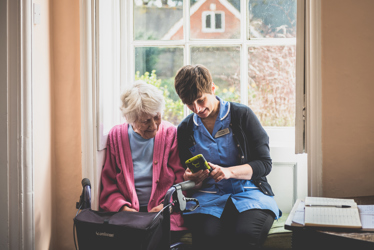Blog

Digital Health Rewired 2026: Access Day One Picks and Exhibitors
Read Article on Digital Health Rewired 2026: Access Day One Picks and Exhibitors
Digital Health Rewired 2026: Access Top Picks for Day Two
Read Article on Digital Health Rewired 2026: Access Top Picks for Day Two
Plan for Change: Local Authority Guide | The Access Group
Read Article on Plan for Change: Local Authority Guide | The Access Group
All‑in‑One Care Management Systems vs Standalone Tools – Which Is Better for Care Homes?
Read Article on All‑in‑One Care Management Systems vs Standalone Tools – Which Is Better for Care Homes?
How Can HR Balance AI Adoption with Compliance and Culture?
Read Article on How Can HR Balance AI Adoption with Compliance and Culture?
Introducing Stories of Care: A Space for Reflection and Recognition
Read Article on Introducing Stories of Care: A Space for Reflection and Recognition
How Can Care Homes Track Training and Competency Digitally?
Read Article on How Can Care Homes Track Training and Competency Digitally?
SEND Crisis in England: Solutions for Local Authorities
Read Article on SEND Crisis in England: Solutions for Local Authorities
Technology-Enabled Care in Home Care Services
Read Article on Technology-Enabled Care in Home Care Services
2025 - A Year of Relentless Innovation in Recruitment Technology
Read Article on 2025 - A Year of Relentless Innovation in Recruitment Technology
Employee Spotlight: Chloe McKiernan
Read Article on Employee Spotlight: Chloe McKiernan
How Can Care Homes Prepare for Data-Driven Regulation
Read Article on How Can Care Homes Prepare for Data-Driven Regulation
What Questions Should Care Homes Ask Software Vendors?
Read Article on What Questions Should Care Homes Ask Software Vendors?
Leading the Way in Innovation: Sutton Residents Discuss Access TEC Solutions
Read Article on Leading the Way in Innovation: Sutton Residents Discuss Access TEC Solutions
Mistakes Care Homes Make When Choosing Software
Read Article on Mistakes Care Homes Make When Choosing Software
Why schools, academies and trusts love Access Education Budgets: Real stories, Real results
Read Article on Why schools, academies and trusts love Access Education Budgets: Real stories, Real results
6 HR Trends and Priorities for HR Teams in 2026
Read Article on 6 HR Trends and Priorities for HR Teams in 2026
Staff rota abbreviations for hospitality managers & HR teams
Read Article on Staff rota abbreviations for hospitality managers & HR teams
How to make a rota
Read Article on How to make a rota
How Far in Advance Should You Plan a Staff Rota?
Read Article on How Far in Advance Should You Plan a Staff Rota?
Strategies for effective skeleton staff management
Read Article on Strategies for effective skeleton staff management
Ensuring a fair rota system in hospitality industry
Read Article on Ensuring a fair rota system in hospitality industry
4 top tips to improve employee engagement in the hospitality industry
Read Article on 4 top tips to improve employee engagement in the hospitality industry
Click, clock… getting time & attendance right
Read Article on Click, clock… getting time & attendance right
Does your hospitality business need staff scheduling software?
Read Article on Does your hospitality business need staff scheduling software?
Mental Health Act 2025: Key Changes Explained
Read Article on Mental Health Act 2025: Key Changes Explained
Charity sport event ideas: what works, what doesn’t, and how to raise more
Read Article on Charity sport event ideas: what works, what doesn’t, and how to raise more
Charity digital strategy in 2026: a simple 4-step guide
Read Article on Charity digital strategy in 2026: a simple 4-step guide
Smart Technology for Healthcare: Beyond the Buzzword
Read Article on Smart Technology for Healthcare: Beyond the Buzzword

 AU & NZ
AU & NZ
 SG
SG
 MY
MY
 US
US
 IE
IE